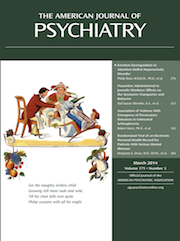Results of a Multicenter Randomized Controlled Trial of the Clinical Effectiveness of Schema Therapy for Personality Disorders
Abstract
Objective
The authors compared the effectiveness of 50 sessions of schema therapy with clarification-oriented psychotherapy and with treatment as usual among patients with cluster C, paranoid, histrionic, or narcissistic personality disorder.
Method
A multicenter randomized controlled trial, with a single-blind parallel design, was conducted between 2006 and 2011 in 12 Dutch mental health institutes. A total of 323 patients with personality disorders were randomly assigned (schema therapy, N=147; treatment as usual, N=135; clarification-oriented psychotherapy, N=41). There were two cohorts of schema therapy therapists, with the first trained primarily with lectures and the second primarily with exercises. The primary outcome was recovery from personality disorder 3 years after treatment started (assessed by blinded interviewers). Secondary outcomes were dropout rates and measures of personality disorder traits, depressive and anxiety disorders, general psychological complaints, general and social functioning, self-ideal discrepancy, and quality of life.
Results
A significantly greater proportion of patients recovered in schema therapy compared with treatment as usual and clarification-oriented psychotherapy. Second-cohort schema therapists had better results than first-cohort therapists. Clarification-oriented psychotherapy and treatment as usual did not differ. Findings did not vary with specific personality disorder diagnosis. Dropout was lower in the schema therapy and clarification-oriented psychotherapy conditions. All treatments showed improvements on secondary outcomes. Schema therapy patients had less depressive disorder and higher general and social functioning at follow-up. While interview-based measures demonstrated significant differences between treatments, differences were not found with self-report measures.
Conclusions
Schema therapy was superior to treatment as usual on recovery, other interview-based outcomes, and dropout. Exercise-based schema therapy training was superior to lecture-based training.



